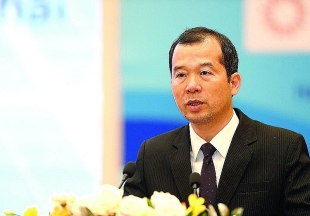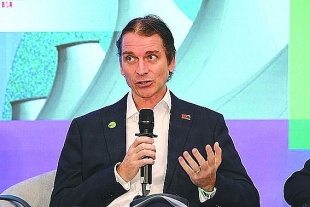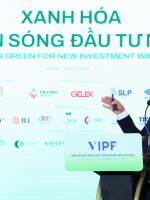
Net Zero target
Vietnam is among the five most vulnerable countries in the world to climate change and is increasingly affected directly by climate change, including rising sea levels, extreme weather events and changing rainfall patterns.
According to preliminary calculations by the World Bank from 2022, the Vietnamese economy will suffer a loss of about USD 10 billion, equivalent to 3.2% of annual GDP due to the impact of climate change. There are no appropriate adaptation and mitigation measures; the estimated impact of climate change on Vietnam is about 12% to 14.5% of GDP per year by 2050.
Mr. Ta Dinh Thi, Vice Chairman of the National Assembly’s Committee on Science, Technology and Environment, forecasts that in the coming years, electricity demand will grow by about 8-10% per year. Meanwhile, fossil energy sources such as coal, oil and gas are gradually depleting and causing harm to the environment. This poses a major challenge in ensuring a stable and sustainable energy supply while increasing the pressure to find alternative energy solutions.
Therefore, energy transition is not only an important task but also a key factor to ensure energy security, protect the environment and promote sustainable socio-economic development.
In addition to the efforts of management agencies, many enterprises have also implemented activities to reduce greenhouse gas emissions to contribute to the implementation of the net zero targets such as: PVN, Petrolimex, Vinfast, Vinamilk, TH True Milk…, in which Vinfast alone set a net zero target by 2040. In addition, enterprises operating in the food and beverage sector also have very active activities to reduce greenhouse gas emissions. Banks have joined the Government to implement the net zero target, energy transition, and green economic development.
“This is proof that at different levels we have taken very proactive and positive steps to accelerate the process of transforming the economic model from brown to green, developing low-carbon emissions,” said the Deputy Chairman of the National Assembly’s Committee on Science, Technology and Environment.
Need for innovative incentive policies
The transition to clean energy is not easy because building a clean energy supply system requires large investments. Along with that, technology in the production and storage of renewable energy is still limited, making it difficult to ensure stable energy supply. Data from the Vietnam Energy Association shows that the investment capital demand for the electricity industry in the period of 2021-2030 is about USD 134.7 billion (USD 13.4 billion /year), but the implementation in the past three years has only been about USD 30 billion (USD 8.5 billion /year), in the remaining 6.5 years, it is necessary to invest USD 105 billion (USD 16.1 billion /year), which is a big challenge.
Meanwhile, the current power system infrastructure has not met the requirements for integrating a high proportion of variable renewable energy (solar and wind power), causing difficulties in operation due to the lack of flexible sources and energy storage systems. In addition, legal regulations for offshore wind power development are still lacking, and there are many problems in negotiating power purchase agreements with LNG power projects. The electricity market is slow to develop, electricity price is not flexible according to input factors, green fuel technologies such as hydrogen and carbon capture and storage technology are still in the testing phase and have not been commercialized, and the cost is high.
In addition, green fuel technology for industry and transportation such as hydrogen fuel technology is still in the experimental stage, not yet commercialized; carbon capture and storage technology still faces many challenges and is expensive… In addition, the legal basis for deploying baseload power sources and renewable energy sources has not been completed. The decree on the direct power purchase mechanism (DPPA); the mechanism to encourage self-produced and self-consumed rooftop solar power with the goal of 50% of office buildings and 50% of houses using self-produced and self-consumed rooftop solar power by 2030… has not been issued. Regulations on mobilizing flexible power sources, price framework for buying and selling electricity with battery storage systems (BESS) and pumped storage hydropower… are also not available.
Experience from countries around the world shows that building a transparent and stable legal framework is a key factor in attracting investment and promoting the development of renewable energy. Most pioneering countries such as Germany, Denmark and the United States have developed flexible legal frameworks to promote the integration of renewable energy into the national power system. Supporting policies such as subsidies, tax incentives and research and development funding programs also play an important role in promoting the transition.
Therefore, experts believe that, despite having large reserves and potential, the development of renewable energy in Vietnam is currently slowing down. Therefore, in order to fully exploit the inherent potential of renewable energy, it is necessary to have breakthrough incentive policies to expand the renewable energy market, promote and deploy new technologies, provide appropriate opportunities, and encourage the use of renewable energy in all important areas. In addition, Vietnam is in great need of breakthrough incentive policies to expand the renewable energy market, promote and deploy new technologies, provide appropriate opportunities, and encourage the use of renewable energy in all important areas…
Mr. Nguyen Anh Tuan, Vice President and General Secretary of the Vietnam Energy Association, affirmed that policies promoting the transition to renewable energy such as solar power, wind power, biomass power, hydrogen, etc. will offset future energy shortages, as well as meet Vietnam’s strategy of transitioning to a green economy and its international commitment to zero net emissions by 2050. To do this, it is necessary to complete legal documents to deploy baseload power sources to replace coal power, especially developing renewable energy sources.
To complete legal regulations related to energy conversion, the Vice President and General Secretary of the Vietnam Energy Association said that it is necessary to soon complete legal documents to have a legal basis for deploying baseload power sources and renewable energy sources.
Regarding implementation, according to Mr. Nguyen Anh Tuan, ministries and branches need to support localities in promoting renewable energy projects, piloting the early implementation of offshore wind power projects with specific mechanisms, as well as increasing the base power source (replacing coal power) through piloting the application of power purchase contracts with a number of LNG power projects, and piloting investment in a number of new energy production facilities such as green hydrogen, green ammonia, and synthetic biofuels.
According to Mr. Vu Hai Luu, Department of Science, Technology and Environment (Ministry of Transport), the transport sector is implementing many solutions to reduce greenhouse gas emissions. In the period of 2031-2050, the sector sets a target of at least 50% of vehicles using electricity and green energy; 100% of taxis will be replaced or newly invested in using electricity and green energy; the proportion of public passenger transport in special urban areas and type 1 urban areas will be at least 40% and 10%, respectively. To achieve these goals, the Ministry of Transport will also implement key tasks and solutions such as building and perfecting planning policies and institutions; converting vehicles to use electricity and green energy; developing green transport infrastructure; improving energy efficiency and strengthening international cooperation, developing science and technology, and developing human resources.
Mr. Luong Quang Huy, Head of Climate Change Department, Department of Climate Change (Ministry of Natural Resources and Environment): By 2030, Vietnam aims to reduce methane emissions by 30%
 On the journey to net zero emissions by 2050, with a view to 2030, Vietnam aims to reduce methane emissions by 30% compared to 2020; develop a total greenhouse gas emission quota and organize the allocation of emission quotas to greenhouse gas emission facilities to conduct inventories from 2026. To achieve these goals, Vietnam will focus on implementing solutions such as developing clean energy and renewable energy; gradually converting coal power to cleaner energy sources.
On the journey to net zero emissions by 2050, with a view to 2030, Vietnam aims to reduce methane emissions by 30% compared to 2020; develop a total greenhouse gas emission quota and organize the allocation of emission quotas to greenhouse gas emission facilities to conduct inventories from 2026. To achieve these goals, Vietnam will focus on implementing solutions such as developing clean energy and renewable energy; gradually converting coal power to cleaner energy sources.
In the agriculture and forestry sector, attention will be paid to solutions for developing organic agriculture; reusing crop residues and livestock waste; improving productivity and quality of planted forests to increase carbon absorption and reduce emissions; sustainable forest management and forest certification to reduce emissions from deforestation and forest degradation. Vietnam will also step up the implementation of solutions to promote waste and wastewater recycling; improve the development and application of technology in the production of construction materials and complete the system of regulations and standards for green buildings and green urban areas.
Mr. Stuart Livesey, Executive Board Member and Co-Chair of the Green Development Subcommittee of the European Chamber of Commerce in Vietnam (EuroCham): Convincing FDI enterprises about a safe and transparent investment environment
 Renewable energy accounts for a significant share of Vietnam’s power generation capacity. In recent times, a number of important regulations to promote the development of renewable energy have begun to be passed. However, the policies passed have not yet created a sense of security for the foreign business community.
Renewable energy accounts for a significant share of Vietnam’s power generation capacity. In recent times, a number of important regulations to promote the development of renewable energy have begun to be passed. However, the policies passed have not yet created a sense of security for the foreign business community.
In other sectors such as industry and manufacturing, investors are well aware of the regulations and know how much profit their investments will bring. However, in the energy sector in Vietnam, there are still unclear factors that make FDI enterprises hesitate to invest. Meanwhile, the renewable energy market has a lot of potential that Vietnam can take advantage of as many foreign enterprises want to invest here but require that the electricity they use must come from renewable sources. Therefore, Vietnam needs to bring certainty to the domestic energy market, convincing FDI enterprises that this is a safe, transparent and tightly controlled investment environment. This message needs to be communicated consistently from the highest levels of the Government.
Xuan Thao – Bui Diep




